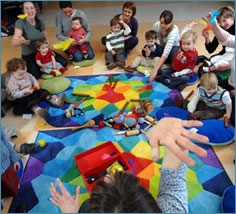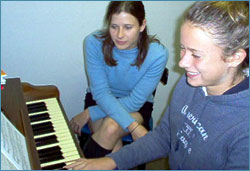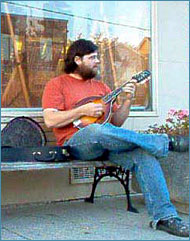The Facts
Why do some children do better in school than others? Because they
make music! Studies have linked active music making with better math and
language skills, boosts in school grades, and improvements in
"spatial-temporal reasoning," which is the foundation of engineering and
science.
In Newsweek magazine's February 19, 1996, cover story, "Your
Child's Brain," it quoted from research done by Gordon Shaw and
Frances Rauscher at University of California at Irvine showing that
music education increases a child's learning ability. The big bottom
line is this: Teach kids music, and they'll have better memory,
concentration, and problem-solving skills.
“Making Music Makes You Smarter” is more than a slogan. It’s a fact
which is backed up by numerous scientific studies. Take a look at some
of the exciting findings which show how exposure to music can affect a
child's intelligence from the earliest stages in life:
Preschoolers
 Research shows that music students are better equipped to
comprehend mathematical and scientific concepts. A group of
preschoolers received private piano keyboard lessons and singing
lessons. A second group received private computer lessons. Those
children who received piano/keyboard training performed 34 percent
higher on tests measuring spatial-temporal ability than the others.
“Spatial-temporal” is basically proportional reasoning –- ratios,
fractions, proportions and thinking in space and time. This concept
has long been considered a major obstacle in the teaching of
elementary math and science. Research shows that music students are better equipped to
comprehend mathematical and scientific concepts. A group of
preschoolers received private piano keyboard lessons and singing
lessons. A second group received private computer lessons. Those
children who received piano/keyboard training performed 34 percent
higher on tests measuring spatial-temporal ability than the others.
“Spatial-temporal” is basically proportional reasoning –- ratios,
fractions, proportions and thinking in space and time. This concept
has long been considered a major obstacle in the teaching of
elementary math and science.
Source: Neurological Research February 28, 1997
Elementary grade children
 Secondary school students Secondary school students
-
A ten-year study, tracking more than 25,000 students, shows that
music-making improves test scores. Regardless of socioeconomic
background, music-making students get higher marks in standardized
tests than those who had no music involvement. The test scores studied
were not only standardized tests, such as the SAT, but also in reading
proficiency exams.
Source: Dr. James Catterall, UCLA, 1999
Pre-university students
- Music can help students get into a better university. In 2001, SAT
takers with coursework/experience in music performance scored 57
points higher on the verbal portion of the test and 41 points higher
on the math portion than students with no coursework/experience in the
arts. And, it appears that the longer you study music, the better you
do in testing.
Source: "College-Bound Seniors National Report: Profile of SAT
Program Test Takers." Princeton, NJ: The College Entrance Examination
Board, 2001.
University students
 Music majors are the most likely group of college grads to be
admitted to medical school. Physician and biologist Lewis Thomas
studied the undergraduate majors of medical school applicants. He
found that 66 percent of music majors who applied to med school were
admitted, the highest percentage of any group. For comparison, 44
percent of biochemistry majors were admitted. Also, a study of 7,500
university students revealed that music majors scored the highest
reading scores among all majors including English, biology, chemistry
and math. Music majors are the most likely group of college grads to be
admitted to medical school. Physician and biologist Lewis Thomas
studied the undergraduate majors of medical school applicants. He
found that 66 percent of music majors who applied to med school were
admitted, the highest percentage of any group. For comparison, 44
percent of biochemistry majors were admitted. Also, a study of 7,500
university students revealed that music majors scored the highest
reading scores among all majors including English, biology, chemistry
and math.
-
Sources: “The Comparative Academic Abilities of Students in
Education and in Other Areas of a Multi-focus University,” Peter H.
Wood, ERIC Document No. ED327480
“The Case for Music in the Schools,” Phi Delta Kappan,
February, 1994
|
|
|